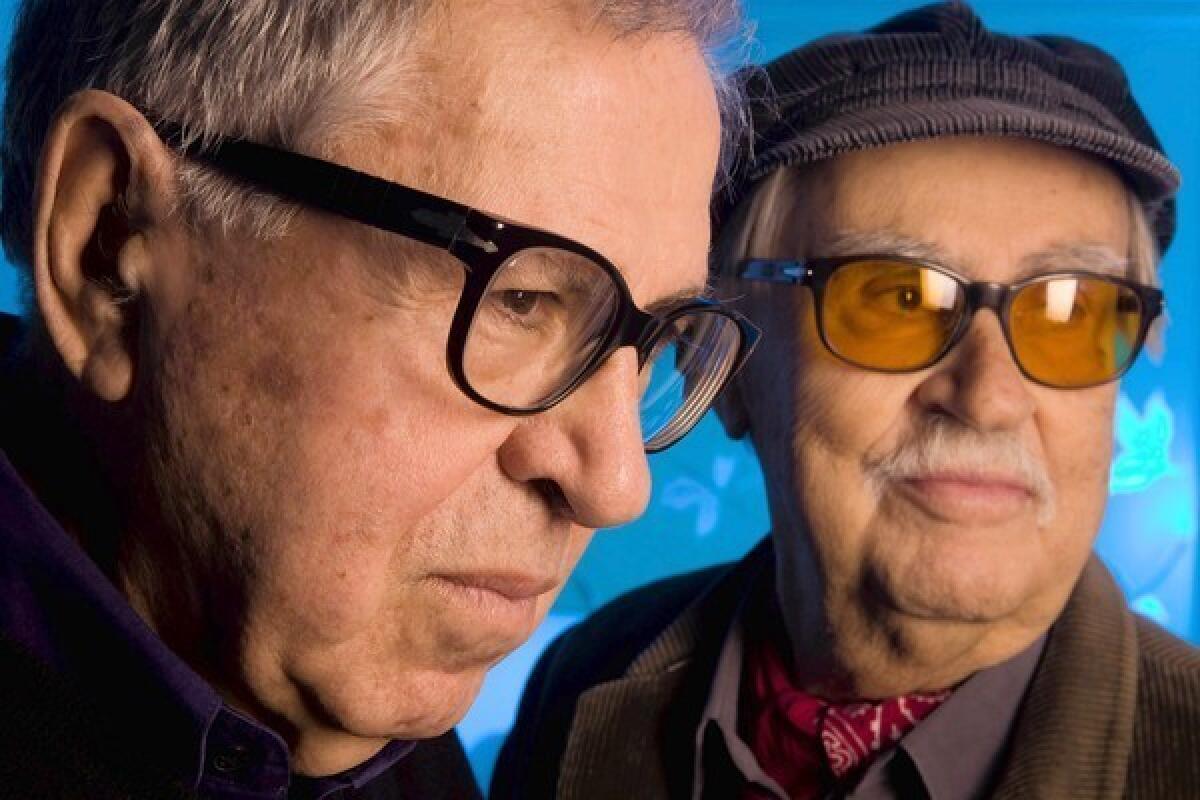Paolo and Vittorio Taviani meet their toughest crowd by far

- Share via
The veteran Italian directors Paolo and Vittorio Taviani (“Padre Padrone,” “The Night of the Shooting Stars”) encountered casting difficulties with their latest film — not from demanding divas or control-freak actors but from hardened criminals serving time in the high-security section at Rome’s Rebibbia prison.
Directed in a semi-documentary style in both black-and-white and color, “Caesar Must Die” revolves around the auditions, rehearsals and performance by the prison inmates of Shakespeare’s “Julius Caesar.” The film opens in Los Angeles on Friday.
Such prison theater programs are common in Europe; there are 110 of them in Italy.
CLASSIC HOLLYWOOD: Coverage of the bygone eras of film and TV
The problem arose after auditions, when it was time to assign roles, Paolo Taviani, 81, recalled during a recent visit to Los Angeles with his brother for an Italian film festival at the American Cinematheque. One of the inmates spoke up to protest their choices.
“He and his group of friends — like a little mafia — said, ‘We have already assigned our own roles,’” Taviani said through a translator as he and his brother, Vittorio, 83, sipped espresso in their Beverly Hills hotel suite.
The Tavianis didn’t back down, even though they were dealing with members of Camorra and other mafia organizations who, in some cases, had committed multiple murders.
“I said, ‘Let’s make one thing very clear,’ ” Paolo said. “ ‘There is one boss — and in this case there are two directors so there are two bosses.’ We explained how things worked in cinema. And their boss, the one who plays Cassius, said, ‘Yes I, understand what you are saying, but you have to keep in mind you are speaking to me and I have made three children orphans.’ We said, ‘We understand who we are dealing with and we are going home. If you call us, we will come back.’ ”
The siblings were on edge for five days, wondering if the phone would ring.
PHOTOS: Hollywood Backlot moments
“Finally, they did call us,” Paolo said. “When we got back to prison, they welcomed us with big applause. Their boss came to us and said, ‘You are going to be our boss and do it your way. We will accept you as our bosses because, when you talked to us from the very beginning, you looked at us straight in the eyes and every other person lowers his or her gaze.”
The Tavianis were inspired to do “Caesar Must Die,” which was Italy’s official submission for the foreign language film Oscar race but didn’t get a nomination, after attending a passionate, moving performance of Dante’s “Divine Comedy” at the prison.
“There was this one prisoner who was reading the part of the love of Paolo and Francesca,” Paolo said. “Their love was impossible and condemned. The convict said before reading, ‘I want to tell you, you may think you understand Dante, but you will never be able to understand it the way we do because we are condemned not to love anymore. Our women are far away and we are desperate for love.’”
The brothers set up a meeting with director Fabio Cavalli, who has led the theater program at the prison for the last decade, about doing a film revolving around a performance of “Julius Caesar.”
The Tavianis chose the play because it is set in Italy.
“It is part of the cultural and popular imagination,” Vittorio said. “In Shakespeare’s ‘Julius Caesar,’ there is crime, homicide, power, betrayal of friends. They were all the actions or crimes that were part of the inmates’ life when they were outside of prison.”
The prisoners also saw the parallel between their lives and the machinations of “Julius Caesar.”
PHOTOS: Celebrity portraits by The Times
“They said, ‘Shakespeare is our brother,’ ” Vittorio said. “Even though it was written 500 years ago, Shakespeare was talking about these terrible things we know today. They recognized themselves.”
Salvatore Striano, who plays Brutus, is the only actor in the film who was not a prisoner. But he had been an inmate there for eight years because of his involvement with the Camorra. Since his release from prison, he has appeared in several movies.
Stephen Ujlaki, dean of the Loyola Marymount School of Film and Television, said “Caesar Must Die” “is a great concept, beautifully executed and gives such a new meaning to the play because of the circumstances.”
The brothers, Ujlaki noted, are “adored in Italy. They are highly respected because they are considered to be true poets. They are filmmakers who are always searching for the truth without any concession to popular fads. They are true artists.”
After completing the film, the brothers returned to the prison to screen the movie.
“They were looking forward to seeing themselves,” Paolo said. “They were very happy to think this movie would go all over Italy — that friends and enemies were going to see the movie, recognize them and remember they were in jail. Our hope as directors is that cinema goers, when they see this movie, will reflect and think that even a man who has killed another man is still a human being.”
Are you an aficionado of iconic Hollywood? Like us on Facebook and go to the Classic Hollywood landing page to get more Times coverage.
PHOTOS AND MORE
VIDEO: The making of ‘Argo,’ ‘Les Miz’ and more
ENVELOPE: The latest awards buzz
PHOTOS: NC-17 movies: Ratings explained
More to Read
Only good movies
Get the Indie Focus newsletter, Mark Olsen's weekly guide to the world of cinema.
You may occasionally receive promotional content from the Los Angeles Times.











